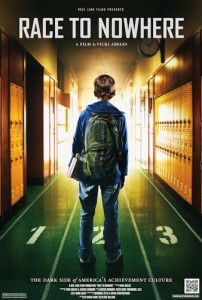 Like many people I spoke to in the audience, I was both dreading and looking forward to seeing Race to Nowhere, a documentary about the impact of undue academic pressures, which was presented by the Orfalea Foundation and UCSB Arts & Lectures last weekend.
Like many people I spoke to in the audience, I was both dreading and looking forward to seeing Race to Nowhere, a documentary about the impact of undue academic pressures, which was presented by the Orfalea Foundation and UCSB Arts & Lectures last weekend.
Mostly I was worried that watching the movie would become–ironically enough–a homework project for ME in that I feared that its depiction of the negative effects of too much homework and too much pressure to do well in school might motivate ME to want to take on the Sisyphean task of trying to change our educational system.
It’s not exactly a feel good movie, but it certainly is an effective one.
The movie did make me want to do something.
Directed by concerned mother Vicki Abeles, “Race to Nowhere” paints a scary story where cheating has become commonplace, students are disengaged from what they are supposed to be learning, stress-related illness and depression are rampant, and many young people arrive at college and the workplace unprepared and uninspired.
Plus, as one high school girl points out in the movie, “we live in a society today where you have to be smart, but also pretty, and also you have to do sports, and you have to be involved in art, and you have to find something unique about yourself. And you have to know yourself, because if you don’t know yourself then you’re going to lose yourself.”
Aurgh! Is it any wonder that, as Dr. Madeline Levine, a psychologist and expert on student stress who was in the movie and participated on the panel afterward, says, “20% of high school kids have major stress diagnosis or an anxiety disorder of some kind.”
They’ve spent their entire childhoods building their resumes.
It seems so overwhelming.
A lot of the challenges pointed out in the film–the federally mandated No Child Left Behind requirements; the emphasis on testing; too many students “qualified” for top universities and not enough spots available; global economic competition–are just too huge to even think about trying to overcome as a lone parent, but there is one issue that actually seems surmountable, even by little ol’ me.
Homework.
Despite the fact that, as friends with older kids taking AP classes remind me, our sixth grade son is “just getting started” on the homework treadmill, our entire household spends a ridiculous amount of time talking about homework, negotiating about homework, whining about homework and even crying about homework.
Yes, I am the one who usually cries about homework and does a little happy dance on the rare nights when he doesn’t have any. It’s painful and quite frankly we’d all be a lot happier if there were less of it.
Our son’s homework, with the exception of reading and studying for tests, is overwhelmingly full of busywork. Coloring endless pages of a “keepsake” book from a field trip is not a good use of the wee hours of the night, in my opinion. Coloring is supposed to be fun, right? Even the so-called “fun” projects like creating dioramas, board games or giant posters usually involve multiple trips to the crafts store searching for expensive supplies to create projects that require way too much parent participation and take way too much time.
Plus, when you look into the academic research about homework, there’s very little to support it, especially for younger children. According to the movie, there’s no correlation between homework and academic achievement in elementary school, and the correlation flatlines after two hours of high school homework.
“Kids are developing more school-related stomachaches, headaches, sleep problems, and depression than ever before,” writes William Crain, a professor of psychology and author of “Reclaiming Childhood: Letting Children Be Children in Our Achievement-Oriented Society.” “We’re seeing kids who are burned out by fourth grade. Soon, it will be by second grade.”
The other thing too much homework does is cut into kids’ time for physical activity (even though we’re worried about childhood obesity), as well as family time and even household chores. How can we teach our son to be a responsible member of our household (let alone society) when he doesn’t have time to do the friggin dishes?
Among the suggestions for parents at the end of the movie are to “reduce performance pressure” and “allow time for play, family, friends, downtime, reflection and sleep.” Those sound like do-able ideas to me. But can you help us out here, teachers? How about a little less homework.
